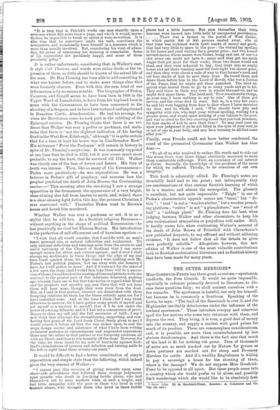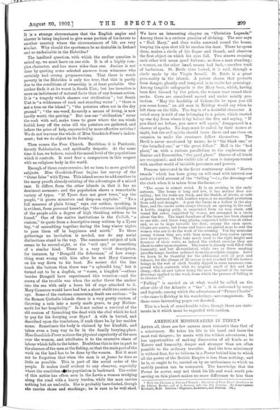THE OUTER HEBRIDES.*
Miss GOODRICH-FREER has three great aversions,—sportsmen, landlords, the Free Church. It would be quite impossible, especially in columns primarily devoted to literature, to dis- cuss these questions fully ; we shall content ourselves with a few remarks. The sportsman is hateful, not only for himself, but because he is commonly a Southron. Speaking of the Lewis, he says: " The trail of the Sassenach is over it, and the Highlander inevitably deteriorates under the influence of the lowland sportsman." These intruders overpay and otherwise spoil the few natives who come into relations with them, and depress the rest. They bring, it is true, a good deal of money into the country, and supply a market with good prices for much of its produce. These are commonplace considerations, and, it is possible, are more than counterbalanced by less obvious disadvantages. And there is the fact also that much of the land is fit for nothing but game. Tens of thousands of acres are as much marked out by Nature for grouse as down pastures are marked out for sheep and Pevensey Marshes for cattle. And if a wealthy Englishman is willing to pay a sovereign a brace for the shooting of them, where is the damage? We do not suppose Miss Goodrich- Freer to be opposed to all sport. But these people oome into a country where she would prefer to be alone, and possibly limit wanderings which she would like to be absolutely free.
• Outer Isles. By A. Goodrich-Freer. London: A. Constable and Co. rlEs. 6c1. net.1 It is a strange circumstance that the English angler and shooter is being implored to give some portion of his favour to another country where the circumstances of life are very similar. Why should the sportsman be so desirable in Ireland and so undesirable in the Hebrides ?
The landlord question, with which the crofter question is mixed up, we must leave on one side. It is of a highly com- plex character, and has more sides than one. Justice is not done by quoting some selected answers from witnesses who certainly bad strong prepossessions. That there is much poverty in the Hebrides is only too true, that this is partly due to the conditions of ownership is at least probable. Our author finds it at its worst in South Uist; but her invective is more an indictment of natural facts than of any human action. It is "a tragedy which shames our civilisation" ; but South Uist is " a wilderness of rock and standing water"; " there is not a tree on the island "; "the potatoes often rot in the dry ground " ; " the sea-weed, formerly a means of living, is now hardly worth the getting." But can our " civilisation " cover the rock with soil, make trees to grow where the sea winds forbid, keep off the rains till the potatoes are gathered, and inflate the price of kelp, superseded by more effective articles ? We do not traverse the whole of Miss Goodrich-Freer's indict- ment; but we do object to its framing.
Then comes the Free Church. Doubtless it is Puritanic, fiercely Sabbatarian, and spiritually despotic. At the same time it has, we believe, raised the moral level of the populations which it controls. It need fear a comparison in this respect with no religious body in the world.
Enough of these controversies; let us turn to more grateful subjects. Miss Goodrich-Freer begins her survey of the " Outer Isles " with Tyree. This island seems to add another to the many proofs already existing of the advantages of a mixed race. It differs from the other islands in that it has no dominant surname; and the population shows a remarkable variety of types. " If Tyree does not grow trees," say the people, " it grows ministers and deep-sea captains." " To a full measure of plain living," says our author, speaking, it is evident, from personal knowledge, " the extreme intelligence of the people adds a degree of high thinking seldom to be found." One of the native institutions is the Ceilidh, " a custom," to quote from a descriptive essay written by a Tyree boy, " of assembling together during the long winter nights to pass them off in happiness and mirth." To these gatherings no invitation is needed, nor do any social distinctions stand in the way. The commonest subject of talk seems to be second-sight, or the "evil eye," or something of a similar kind. There is a very vivid description, for instance, by "Dougald the fisherman," of how every- thing went wrong with him after he met Mary Cameron on bis way down to his boat. No sooner did the line touch the bottom than there was "a splendid hug," but it turned out to be a dogfish, or " worse, a kingfish "—others besides Dougald have experienced this vexation—and the crown of the trouble was when the sailor threw the anchor into the sea with only a loose bit of rope attached to it. Mary Cameron would have had but a short shrift two centuries ago. Some of the customs concerning death are curious: " In the Roman Catholic islands there is a very pretty custom of throwing a coin into a newly made grave, to pay Mother- earth for her hospitality." Is it not rather a survival of the old custom of furnishing the dead with the obol which he had to pay for his ferrying over Styx ? A wife is buried, and described upon the tombstone, if such there be, by her maiden name. Sometimes the body is claimed by her kinsfolk, and taken even a long way to lie in the family burying-place. Itua.s Goodrich-Freer notices the physical superiority of the men over the women, and 'attributes it to the excessive share of labour which falls to the latter. Doubtless this is due in part to the absence of the men at the fishing, so that the main part of the work on the land has to be done by the women. But it must not be forgotten that when the man is at .home he does as little as possible. This is part of the social order of the people. It makes itself evident to any observer, especially where the condition ollithe population is backward. The writer of this notice has often seen in the Lewis a woman trudging 4ong the road with a heavy burden, while the man carries nothing but an umbrella. She is probably bare-footed, though she carries shoes and stockings ; he is sure to be well shod.
We have an interesting chapter on " Christian Legends." Among these is a curious practice of divining. The seer says a " Hail Mary," and then walks sunward round the house, keeping his eyes shut till he reaches the door. There he opens them, makes a circle of his finger and thumb, and observes the first object on which his eyes fall. Two straws crossing each other will mean good fortune ; so does a man standing ; a woman, on the other hand, means bad luck,—another trait of barbarism. St. Bride thus looked, it is said, through a circle made by the Virgin herself. St. Bride is a great personality in the islands. A potent charm that protects from danger, ghostly and temporal, is to recite her genealogy. Among tangible safeguards is the Mary bean, which, having been first blessed by the priest, the women wear round their necks. Cows are considered sacred and under saintly pro- tection. "May the herdahip of Columcille be upon you till you come home," an old man in Eriakay would say when he left them on the hills. The dog is of a doubtful character. A weird story is told of one belonging to a priest, which started up one day from where it lay before the fire, and saying, " If you liked me before, you never will again," disappeared in a shower of sparks. No dogs must be called by their names at night, lest the evil spirits should learn them and use them on occasion to make the creatures follow themselves. The Devil is never mentioned by name; he is "the black one," or "the brindled one," or "the great fellow." Hell is the "bad place," or, with a curious parallelism to the euphemism of Euxine and Eumenides, " the good place." Omens of all kinds are recognised ; and the visible life of man is interpenetrated with another world of invisible presences and powers.
Persons interested in the fierce controversy about "Harris tweeds" which has been going on will read with interest our author's vivid account of the "fulling "—i.e., the dressing—of the cloth when it is taken from the looms :—
"The scene is almost weird. It is an evening in the early autumn. The house is long and low, it has neither floor nor ceiling ; but the walls are thick, and the thatch, of divots, or sods of grass, fastened on with heather ropes, is an excellent protection from cold and draught. A peat fire burns in a hollow in the slay. floor, and the smoke seeks escape through an opening in the roof. A kettle, singing gaily, is suspended from an iron chain, aril round fiat cakes, supported by stones, are arranged in a circle about the fire. The scant furniture of the house has been cleared to one side, and three long planks, supported table-wise at either end, so as to slope towards the door, occupy the open space. Chairs are scarce, but forms and boxes are placed so as to seat the women who are to do the work of the evening. Ten big muscular young women they are, with bare arms, and long coarse aprons over their gowns. They take much heed to the right height and firmness of their seats, as indeed the violent exercise they are about to enter upon requires. The house is already well filled with humanity, and but ill-ventilated, while two or three smoking paraffin-lamps further subtract from the available oxygen. Later we learn to be thankful for the additional reek of peat and tobacco, for the climax of ill savour is not reached till the hostess brings in the web of cloth freshly dipped in some nauseous com- pound which contends with its original smell of fish and hot sheep,—fish oil and tallow being the most fragrant of the various dressings applied to the wool, from which the process of fulling is to cleanse it."
" Fulling " is carried on at what would be called on the other side of the Atlantic a " bee " ; it is enlivened by songs and legends, among which the adventures of "Prince Charlie" —he came to Eriskay in his wanderings—are conspicuous. To these some interesting pages ;Ire devoted.
This is a book of considerable value, though there are state- ments in it which must be regarded with caution.







































 Previous page
Previous page